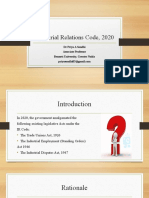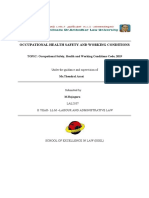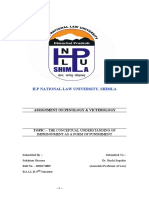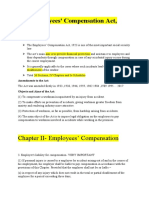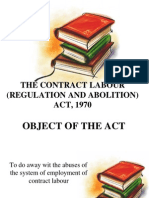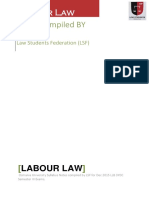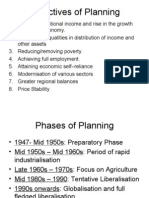Unorganized Sector
Unorganized Sector
Uploaded by
AGl NarhatCopyright:
Available Formats
Unorganized Sector
Unorganized Sector
Uploaded by
AGl NarhatOriginal Description:
Original Title
Copyright
Available Formats
Share this document
Did you find this document useful?
Is this content inappropriate?
Copyright:
Available Formats
Unorganized Sector
Unorganized Sector
Uploaded by
AGl NarhatCopyright:
Available Formats
UNORGANIZED SECTOR
MEANING OF UNORGANIZED SECTOR
Section 2 (l) of the Unorganized Workers Social Security Act, 2008 defines an
unorganised sector as a production or service oriented enterprise owned by individuals
or self employed workers (one who is not working for an employer and is engaged in an
unorgnised sector job earning an income below a threshold or owning land below a
notified limit) and if workers are employed, then the total number of workers cannot
exceed 10.
Unorganized worker” (UW) means a home-based worker, self-employed worker or a wage
worker in the unorganized sector and includes a worker in the organized sector who is not
covered by any Acts mentioned in Schedule II of the Unorganized Workers Social Act
2008.
CHARACTERISTIC OF INFORMAL / UNORGANIZED SECTOR
• Low productivity compared to formal sector
• Lower wages to workers
• Poor working conditions
• Excessive seasonality of employment
• Absence of social security measures
• Negation of social standard
• Poor human capital base (in terms of education, skill and training) as well as lower
mobilization status of the work force
CHARACTERISTICS OF UNORGANIZED WORKERS (UW)
• Have limited or no education or other skills.
• Are hugely scattered and don’t have political pressure groups
• Don’t have fixed jobs i.e. have seasonality as compared to formal sector workers.
• Social stratification is more in them in rural areas on the basis of Caste and sub-
castes.
• Still today, they act as “bonded labour” in some cases due to low incomes &
permanent indebtedness.
• Have insufficient labour laws relating to them.
• Work in very poor working environment.
To overcome the problems of workers in unorganized sector, governments have come up
with certain social security measures.
MEANING OF SOCIAL SECURITY
Social security is "any government system that provides monetary assistance to people
with an inadequate or no income".
ILO defines social security as follows: “The security that society furnishes, through
appropriate organisation, against certain risks, to which its members are exposed. These
risks are essentially contingencies against which the individuals of small means cannot
effectively provide by his, own ability or foresight alone or even in private combination
with fellows”. These risks are being sickness, maternity, invalidity, old age and death. It
is the characteristics of these contingencies that they imperil the ability of the working
man to support himself and his dependents in health and decency.
UNORGANISED SECTOR WORKERS’ SOCIAL SECURITY ACT, 2008.
➢ OBJECT OF THE ACT: to provide for the social security and welfare of
unorganised workers
➢ SCOPE OF THE ACT: It covers “unorganised sector” namely an enterprise
owned by individuals or self-employed workers and engaged in the production or
sale of goods or providing service of any kind whatsoever, and where the enterprise
employs workers, the number of such workers is less than ten.
➢ COVERAGE OF THE ACT: It covers unorganized workers which means home
based workers, self employed worker or a wage worker in the unorganized sector
and includes a worker in the organized sector which is not covered by any of the
acts mentioned in Schedule II.
Sec 2 (b): “home-based worker” means a person engaged in the production of
goods or services for an employer in his or her home or other premises of his or
her choice other than the workplace of the employer, for remuneration,
irrespective of whether or not the employer provides the equipment, materials or
other inputs.
Sec 2 (k) : “self-employed worker” means any person who is not employed by an
employer, but engages himself or herself in any occupation in the unorganised
sector subject to a monthly earning of an amount as may be notified by the Central
Government or the State Government from time to time or holds cultivable land
subject to such ceiling as may be notified by the State Government.
Sec 2 (n): “wage worker” means a person employed for remuneration in the
unorganised sector, directly by an employer or through any contractor, irrespective
of place of work, whether exclusively for one employer or for one or more
employers, whether in cash or in kind, whether as a home-based worker, or as a
temporary or casual worker, or as a migrant worker, or workers employed by
households including domestic workers, with a monthly wage of an amount as may
be notified by the Central Government and State Government, as the case may be.
Schedule II: It includes the following Acts:
i) Workmen’s Compensation Act, 1923
ii) Industrial Disputes Act, 1947
iii) Employees’ State Insurance Act, 1948
iv) Employees’ Provident Funds and Miscellaneous Provisions Act, 1952
v) Maternity Benefit Act, 1961
vi)Payment of Gratuity Act, 1972
SOCIAL SECURITY BENEFITS
Section 3 (1) empowers the Central Government to formulate and notify, from time
to time, suitable welfare schemes for unorganised workers on matters relating to—
(a) life and disability cover; (b) health and maternity benefits; (c) old age
protection; and (d) any other benefit as may be determined by the Central
Government.
Section 3 ( 4) empowers the State Government to formulate and notify, from time
to time, suitable welfare schemes for unorganised workers, including schemes
relating to— (a) provident fund; (b) employment injury benefit; (c) housing; (d)
educational schemes for children; (e) skill upgradation of workers; (f) funeral
assistance; and (g) old age homes.
SOCIAL SECURITY SCHEMES FOR THE UNORGANISED WORKERS
(states in Schedule I of the Act)
1. Indira Gandhi National Old Age Pension Scheme.
2. National Family Benefit Scheme.
3. Janani Suraksha Yojana.
4. Handloom Weavers' Comprehensive Welfare Scheme.
5. Handicraft Artisans' Comprehensive Welfare Scheme.
6. Pension to Master craft persons.
7. National Scheme for Welfare of Fishermen and Training and Extension.
8. Janshree Bima Yojana.
9. Aam Admi Bima Yojana.
10. Rashtriya Swasthya Bima Yojana.
(SEE THE SALIENT FEATURES OF THE SCHEME IN DETAIL)
NATIONAL SOCIAL SECURITY BOARD FOR UNORGANIZED WORKERS
WHO MAY CONSTITUTE?
Section 5 (1) of the Act: The Central Government shall, by notification, constitute
a National Board to be known as the National Social Security Board to exercise the
powers conferred on, and to perform the functions assigned to, it under this Act.
COMPOSITION OF THE NATIONAL SOCIAL SECURITY BOARD
The National Board shall consist of the following members, namely:—
(a) Union Minister for Labour and Employment-Chairperson, ex officio;
(b) the Director General (Labour Welfare)-Member-Secretary, ex officio; and
(c) thirty-four members to be nominated by the Central Government, out of
whom—
(i) seven representing unorganised sector workers;
(ii) seven representing employers of unorganised sector;
(iii) seven representing eminent persons from civil society;
(iv) two representing members from Lok Sabha and one from Rajya Sabha;
(v) five representing Central Government Ministries and Departments concerned;
and
(vi) five representing State Governments.
The Chairperson and other members of the Board shall be from amongst persons
of eminence in the fields of labour welfare, management, finance, law and
administration. Adequate representation shall be given to persons belonging to the
Scheduled Castes, the Scheduled Tribes, the Minorities and Women.
TERM
The term of the National Board shall be three years.
FUNCTIONS
The National Board shall perform the following functions, namely:—
(a) recommend to the Central Government suitable schemes for different sections
of unorganised workers;
(b) advise the Central Government on such matters arising out of the
administration of this Act as may be referred to it;
(c) monitor such social welfare schemes for unorganised workers as are
administered by the Central Government;
(d) review the progress of registration and issue of identity cards to the
unorganised workers;
(e) review the record keeping functions performed at the State level;
(f) review the expenditure from the funds under various schemes; and
(g) undertake such other functions as are assigned to it by the Central Government
from time to time.
STATE SOCIAL SECURITY BOARD FORUNORGANISED WORKERS
WHO MAY CONSTITUTE?
Sec 6 (1) : Every State Government shall, by notification, constitute a State Board
to be known as (name of the State) State Social Security Board to exercise the
powers conferred on, and to perform the functions assigned to it, under this Act.
COMPOSITION OF STATE BOARD
The State Board shall consist of the following members, namely:—
(a) Minister of Labour and Employment of the concerned State—Chairperson, ex
officio;
(b) the Principal Secretary or Secretary (Labour) —Member—Secretary, ex officio;
and
(c) twenty-eight members to be nominated by the State Government, out of
whom—
(i) seven representing the unorganised workers;
(ii) seven representing employers of unorganised workers;
(iii) two representing members of Legislative Assembly of the concerned State; (iv)
five representing eminent persons from civil society; and
(v) seven representing State Government Departments concerned.
The Chairperson and other members of the Board shall be from amongst persons
of eminence in the fields of labour welfare, management, finance, law and
administration. dequate representation shall be given to persons belonging to the
Scheduled Castes, the Scheduled Tribes, the Minorities and Women.
TERM: The term of the State Board shall be three years.
FUNCTIONS
The State Board shall perform the following functions, namely:—
(a) recommend the State Government in formulating suitable schemes for
different sections of the unorganised sector workers;
(b) advise the State Government on such matters arising out of the administration
of this Act as may be referred to it;
(c) monitor such social welfare schemes for unorganised workers as are
administered by the State Government;
(d) review the record keeping functions performed at the District level;
(e) review the progress of registration and issue of cards to unorganised sector
workers;
(f) review the expenditure from the funds under various schemes; and
(g) undertake such other functions as are assigned to it by the State Government
from time to time.
WORKERS FACILITATION CENTRES.
Section 9 of the Act: The State Government may set up such Workers' facilitation
centres as may be considered necessary from time to time to perform the following
functions, namely:—
(a) disseminate information on available social security schemes for the
unorganised workers;
(b) facilitate the filling, processing and forwarding of application forms for
registration of unorganised workers;
(c) assist unorganised worker to obtain registration from the District
Administration;
(d) facilitate the enrollment of the registered unorganised workers in social
security schemes.
REGISTRATION
Section 10 of the Act prescribes for eligibility for registration and social security
benefits. It states that:
(1) Every unorganised worker shall be eligible for registration subject to the
fulfilment of the following conditions, namely:—
(a) he or she shall have completed fourteen years of age; and
(b) a self-declaration by him or her confirming that he or she is an unorganised
worker.
(2) Every eligible unorganised worker shall make an application in the prescribed
form to the District Administration for registration.
(3) Every unorganised worker shall be registered and issued an identity card by the
District Administration which shall be a smart card carrying a unique
identification number and shall be portable.
(4) If a scheme requires a registered unorganised worker to make a contribution,
he or she shall be eligible for social security benefits under the scheme only upon
payment of such contribution.
(5) Where a scheme requires the Central or State Government to make a
contribution, the Central or State Government, as the case may be, shall make the
contribution regularly in terms of the scheme.
You might also like
- Jamia Millia Islamia: Project On Salaries (Session-2018-2019)Document21 pagesJamia Millia Islamia: Project On Salaries (Session-2018-2019)Harshit AgarwalNo ratings yet
- National Culture and ManagementDocument9 pagesNational Culture and ManagementRaj Iyer100% (1)
- Unorganised Workers' Social Security Act, 2008-1Document17 pagesUnorganised Workers' Social Security Act, 2008-1Awadhesh MalviyaNo ratings yet
- Unorganised Workers Social Security ActDocument3 pagesUnorganised Workers Social Security ActnarendrabisoyiNo ratings yet
- Capital Gains1Document56 pagesCapital Gains1api-3832224100% (3)
- Clubbing of Income Under Income Tax ActDocument7 pagesClubbing of Income Under Income Tax ActAnwar Ashraf AshrafiNo ratings yet
- Employees' Provident Fund and Miscellaneous ActDocument20 pagesEmployees' Provident Fund and Miscellaneous ActAnchal PundirNo ratings yet
- Suits by An Indigent PersonDocument12 pagesSuits by An Indigent PersonAshmit Kumar AggarwalNo ratings yet
- Industrial Relations Code 2020Document48 pagesIndustrial Relations Code 2020Shivangi SinghNo ratings yet
- ESI Scheme Salient Features of ESI SchemeDocument8 pagesESI Scheme Salient Features of ESI SchemeanjumanNo ratings yet
- Osh FinalDocument14 pagesOsh FinalpillardvsgNo ratings yet
- Minimum Wages ActDocument4 pagesMinimum Wages ActChandra Sekhar JujjuvarapuNo ratings yet
- National Law Institute University, Bhopal: Subject: Property Law - IDocument9 pagesNational Law Institute University, Bhopal: Subject: Property Law - IKhushi SharmaNo ratings yet
- Income Exempt From Taxsection-10 To 13Document15 pagesIncome Exempt From Taxsection-10 To 13Rohit MohanNo ratings yet
- The Payment of Wages ActDocument2 pagesThe Payment of Wages Actvai8havNo ratings yet
- Workman Compensation Act: ObjectivesDocument17 pagesWorkman Compensation Act: ObjectivesfahadNo ratings yet
- Labour Law ProjectDocument32 pagesLabour Law ProjectKumar YoganandNo ratings yet
- Penology & VictimologyDocument17 pagesPenology & VictimologySaksham SharmaNo ratings yet
- Misstatement and Transfer of SharesDocument27 pagesMisstatement and Transfer of SharesRudraThakur100% (2)
- The Child Labor (Prohibition and Regulation) Act, 1986Document18 pagesThe Child Labor (Prohibition and Regulation) Act, 1986VishuNo ratings yet
- Payment of Wages ActDocument20 pagesPayment of Wages ActmanjushreeNo ratings yet
- Notes - Employees Compensation ActDocument23 pagesNotes - Employees Compensation ActDanika JoplinNo ratings yet
- Payment of Gratuity ActDocument39 pagesPayment of Gratuity ActParul PrasadNo ratings yet
- Bonded Labour System (Abolition) ActDocument18 pagesBonded Labour System (Abolition) ActAditiIndraniNo ratings yet
- The Contract Labour (Regulation and Abolition) ACT, 1970Document37 pagesThe Contract Labour (Regulation and Abolition) ACT, 1970sunaina754No ratings yet
- Payment of Gratutity ActDocument17 pagesPayment of Gratutity ActAkshat YadavNo ratings yet
- Raja Benoy Kumar Sahas RoyDocument32 pagesRaja Benoy Kumar Sahas RoyAvaniJainNo ratings yet
- Payment of Gratuity Act 1972Document21 pagesPayment of Gratuity Act 1972Nitali VatsarajNo ratings yet
- GrtituttyDocument2 pagesGrtituttyNiranjani Duvva Jakkula100% (2)
- Standing Order - Labour LawDocument39 pagesStanding Order - Labour LawArunVermaNo ratings yet
- Tamil Nadu Shops and Establishments Act, 1947 PDFDocument34 pagesTamil Nadu Shops and Establishments Act, 1947 PDFLatest Laws TeamNo ratings yet
- Law 3 Yr LLB at OUDocument24 pagesLaw 3 Yr LLB at OUklllllllaNo ratings yet
- Concept of Lay-Off and RetrenchmentDocument7 pagesConcept of Lay-Off and RetrenchmentDaniyal SirajNo ratings yet
- Return of IncomeDocument9 pagesReturn of Incomes4sahithNo ratings yet
- Duty DrawbackDocument35 pagesDuty DrawbackTuhin SaxenaNo ratings yet
- ARTICLE 19 - 1 (G) : Freedom To Practice Any ProfessionDocument15 pagesARTICLE 19 - 1 (G) : Freedom To Practice Any ProfessionAvni AgrawalNo ratings yet
- Fair Wage: Meaning and ConceptDocument11 pagesFair Wage: Meaning and ConceptVishal SinghNo ratings yet
- M C Mehta Vs State of Tamil NaduDocument4 pagesM C Mehta Vs State of Tamil Nadumahaboob88No ratings yet
- Capital Gains 1Document46 pagesCapital Gains 1NIRAVNo ratings yet
- (CRM) Maternity Benefit ActDocument19 pages(CRM) Maternity Benefit ActAnukrati Bagherwal100% (1)
- Project Report On Convention On Rights of Persons With DisabilitiesDocument19 pagesProject Report On Convention On Rights of Persons With DisabilitiesVanshdeep Singh SamraNo ratings yet
- Lay Off and RetrenchmentDocument9 pagesLay Off and RetrenchmentAbhijit AjayanNo ratings yet
- CommissionDocument16 pagesCommissionMohiuddin KhanNo ratings yet
- Industrial JurisprudenceDocument11 pagesIndustrial Jurisprudenceaakash bansalNo ratings yet
- Ratika Labour LawDocument14 pagesRatika Labour LawManDeepWarwalNo ratings yet
- Employees Compensation Act, 1923Document7 pagesEmployees Compensation Act, 1923Parul Prasad100% (1)
- Winding-Up of The Company With 1956 & 2013 ActDocument18 pagesWinding-Up of The Company With 1956 & 2013 ActAnurag Chaurasia100% (1)
- Indigent PersonDocument4 pagesIndigent PersonNitin SethiNo ratings yet
- Re Exploitation of Children in Orphanage in State of Tamilnadu vs. Union of IndiaDocument11 pagesRe Exploitation of Children in Orphanage in State of Tamilnadu vs. Union of Indiasonasri100% (1)
- Topic 2 Agriculture IncomeDocument16 pagesTopic 2 Agriculture IncomeVikram VermaNo ratings yet
- Arrest Under CRPC: Chapter V of Code of Criminal Procedure, 1973 Deals With TheDocument4 pagesArrest Under CRPC: Chapter V of Code of Criminal Procedure, 1973 Deals With TheHimanshi SaraiyaNo ratings yet
- Equal Enumeration ActDocument11 pagesEqual Enumeration ActHumanyu KabeerNo ratings yet
- Critical Analysis of Patent Act in India: A Project OnDocument15 pagesCritical Analysis of Patent Act in India: A Project OnStuti BaradiaNo ratings yet
- Income From Other SourcesDocument5 pagesIncome From Other SourcesGovarthanan NarasimhanNo ratings yet
- ClosureDocument10 pagesClosureSurya SriramNo ratings yet
- CRPC Assignment: Mohammad Ziya AnsariDocument13 pagesCRPC Assignment: Mohammad Ziya AnsariMohammad Ziya AnsariNo ratings yet
- A Comparative Analysis of The Concept of Workman Changes Brought by The Industrial Relations Code 2020Document15 pagesA Comparative Analysis of The Concept of Workman Changes Brought by The Industrial Relations Code 2020advait100% (1)
- International Labour Standards and Its Implementation in IndiaDocument9 pagesInternational Labour Standards and Its Implementation in IndiaDebasish NandaNo ratings yet
- Unit Introduction, Unorganized SectorDocument30 pagesUnit Introduction, Unorganized Sectorangela antoniaNo ratings yet
- Unorganised Sector Workers' Social Security Act, 2008Document12 pagesUnorganised Sector Workers' Social Security Act, 2008Prajapati Kalpesh BhagvandasNo ratings yet
- Unorganised Sector Social Security Bill 2007Document31 pagesUnorganised Sector Social Security Bill 2007Rohit Jha100% (1)
- Enforcement of Foreign Awards in IndiaDocument5 pagesEnforcement of Foreign Awards in IndiaAGl NarhatNo ratings yet
- Girl Education: A Lifeline To Rural Transformation in India: April 2015Document5 pagesGirl Education: A Lifeline To Rural Transformation in India: April 2015AGl NarhatNo ratings yet
- Judicial Enforcement of Arbitral Awards PDFDocument228 pagesJudicial Enforcement of Arbitral Awards PDFAGl NarhatNo ratings yet
- 04 17 2020 14.46.02 PDFDocument24 pages04 17 2020 14.46.02 PDFAGl NarhatNo ratings yet
- PersepolisDocument10 pagesPersepolisapi-28694606150% (2)
- Conflicts of Law OutlineDocument8 pagesConflicts of Law OutlineJason CabreraNo ratings yet
- Planning and Economic Reforms in IndiaDocument18 pagesPlanning and Economic Reforms in IndiaProfessor Tarun Das50% (2)
- Essay 3Document9 pagesEssay 3api-210601344No ratings yet
- Cost Acc Chapter 8Document20 pagesCost Acc Chapter 82071275No ratings yet
- Unit 2 Study Guide 2015-2Document9 pagesUnit 2 Study Guide 2015-2yayaNo ratings yet
- Namibian Land Law - Law, Land Reform and TheDocument163 pagesNamibian Land Law - Law, Land Reform and TheEnvirosavvyNo ratings yet
- Law 012 - Discrimination in Malaysia (Education)Document2 pagesLaw 012 - Discrimination in Malaysia (Education)Inaz IdNo ratings yet
- Tracy Arueyingho TkambDocument4 pagesTracy Arueyingho TkambMassie ArueyinghoNo ratings yet
- Waiver Form Khelo India PuneDocument1 pageWaiver Form Khelo India Puneyuvishkachauhan123100% (1)
- Comparative Police SystemDocument4 pagesComparative Police SystemAndrewjerome BaitNo ratings yet
- Checklist For Returning OfficerDocument176 pagesChecklist For Returning OfficerAnsuman SatapathyNo ratings yet
- The Truth About Proposition 39 ColocationsDocument2 pagesThe Truth About Proposition 39 ColocationsRobert D. SkeelsNo ratings yet
- VisaTraveler Ebook Travel VISA FREEDocument39 pagesVisaTraveler Ebook Travel VISA FREEChaitanya TallapaneniNo ratings yet
- Combinepdf PDFDocument399 pagesCombinepdf PDFPuppyNo ratings yet
- Corfu CaseDocument19 pagesCorfu CasebutterflygigglesNo ratings yet
- PPGC Midterm ReviewerDocument28 pagesPPGC Midterm ReviewerArnold Rolex LuzanoNo ratings yet
- Customs Tariff CalculatorDocument2 pagesCustoms Tariff Calculatoriroshan29No ratings yet
- An Analysis of Gram Nyayalaya Act, 2008 FDRDocument15 pagesAn Analysis of Gram Nyayalaya Act, 2008 FDRPrakash Kumar0% (1)
- Identity and Alienation: A Study of Mahmoud Darwish's ID Card' and Passport'Document4 pagesIdentity and Alienation: A Study of Mahmoud Darwish's ID Card' and Passport'IJELS Research Journal100% (1)
- Ceo Appraisal ToolDocument9 pagesCeo Appraisal ToolAman SukhijaNo ratings yet
- Ar8105 (C)Document1 pageAr8105 (C)Anonymous 3v1z9l0% (1)
- Inmigrant Sex Work Rio 1920Document28 pagesInmigrant Sex Work Rio 1920Andreia MenezesNo ratings yet
- Lessons From The Indo-China War. Vol - 2Document398 pagesLessons From The Indo-China War. Vol - 2Uncle Joffe86% (7)
- UN General Assembly ReportDocument8 pagesUN General Assembly ReportAngel Lou AguitongNo ratings yet
- Factiva 20191022 1021 PDFDocument2 pagesFactiva 20191022 1021 PDFAnonymous tTk3g8No ratings yet
- Anarchy Rules Rwanda's Capital and Drunken - 14 April 1994 Soldiers Roam CityDocument4 pagesAnarchy Rules Rwanda's Capital and Drunken - 14 April 1994 Soldiers Roam CityKagatamaNo ratings yet
- 931 1 Walk-In-Interview Airport ManagerDocument9 pages931 1 Walk-In-Interview Airport ManagerRio RioNo ratings yet
- English 9 - Parallelism Asynchronous Activity PDFDocument2 pagesEnglish 9 - Parallelism Asynchronous Activity PDFJasmine Manansala SantosNo ratings yet








